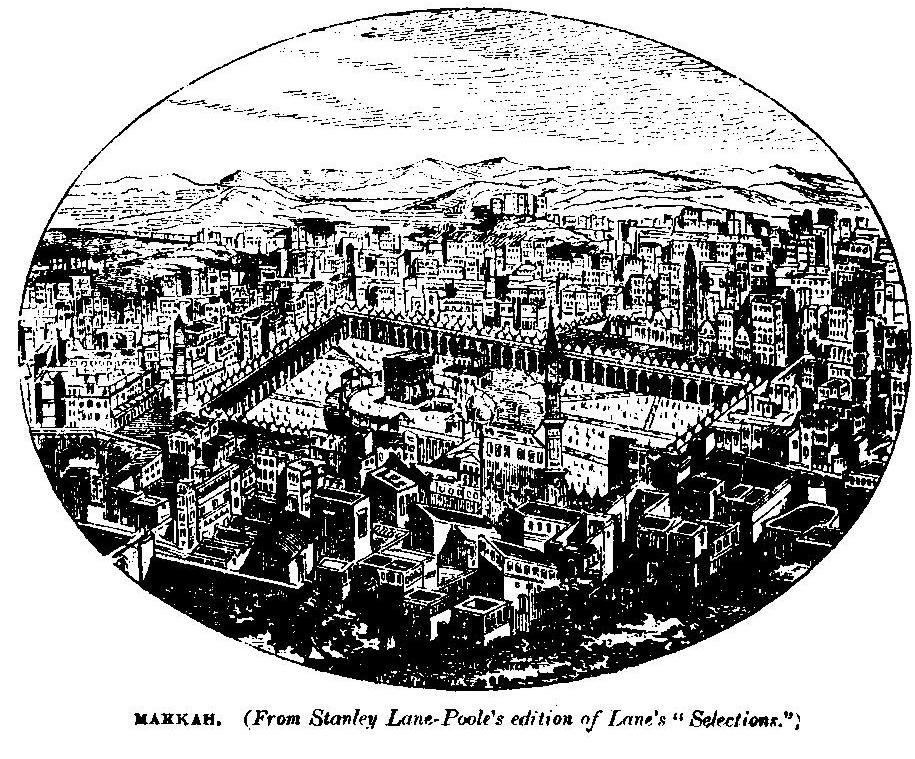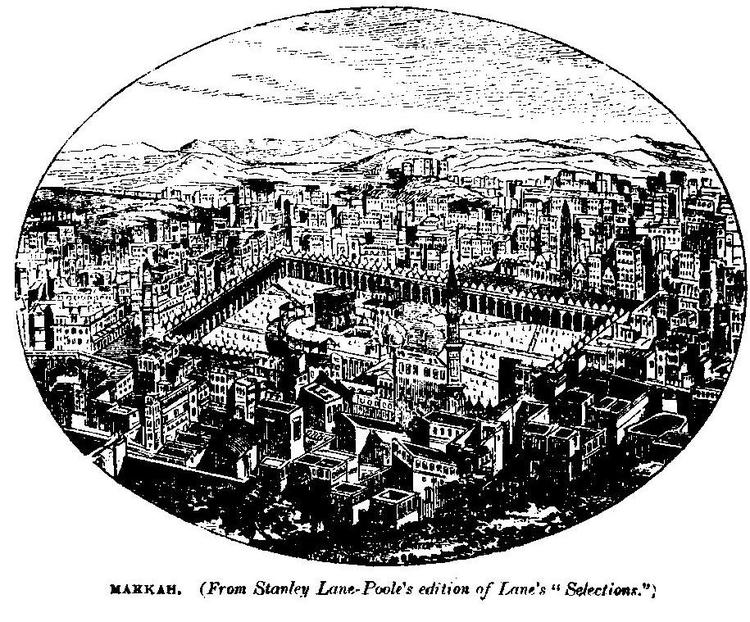MAKKAH. The capital of Arabia, and the most sacred city of the Muslims. It is celebrated as the birth-place of Muhammad, and as the site of the Ka’bab, or Sacred Cube, building. Muhammad is related to have said of Makkah, “What a splendid city thou art! If I had not been driven out of thee by my tribe, I would dwell in no other place but in thee.” ”It is not man bur God who made Makkah sacred.”
My people will be always safe in this world and the next, as long as they respect Makkah” (Mishkat, book xi. ch. xv.)
Makkah (the ancient name of which was Makkah) is situated in about 21° 30′ N. lat, 40° 20′ E. long., and 70 miles from the Red Sea, in a sandy valley running north and south, and from 100 to 70 paces broad. The chief part of the city is placed where the valley is widest. In the narrower part there are single rows of houses only, or detached shops. The town itself covers a space of about 1,500 paces in length, but the whole extent of ground comprehended under the denomination of Makkah, amounts to 3500 paces in length The surrounding rocky hills are from 200 to 500 feet in height, barren, and destitute of trees. Most of the town is situated in the valley itself, but there are some parts built on the sides of the hills. The streets are in general broader than those of Eastern cities, for the purpose of accommodating the vast number of pilgrims who resort to it. The houses are lofty and of stone, and the numerous windows that face the streets give to these quite a European aspect. Many of the houses are three stories high.
The only public place in the body of the town is the large square of the great mosque, which is enlivened during the Hajj (Pilgrimage) by a great number of well-stored shops. The streets are all unpaved, and in summer the sand and dust are as great a nuisance as the mud is in the rainy season, during which they are scarcely passable after a storm.
Makkah is badly provided with water. There are a few cisterns for receiving rain, and the well-water is brackish. The famous well of Zamzam, in the great mosque is indeed copious enough to supply the whole town, but the water is not well tasted. The best water is brought by an aqueduct from the vicinity of Arafah, six or seven miles distant There are two places in the interior of the city, where the aqueduct runs above ground, and in these parts it is let off into small channels or fountains, at which some slaves of the Sharif (the ruler of the city) are stationed to exact a toll from persons who fill their water-skins.
All the houses in Makkah except those of the principal and richest inhabitants, are constructed for the accommodation of lodgers, and divided into numerous separate apartments, each consisting of a sitting-room and a small kitchen. Except four or five houses belonging to the Sharif, two colleges, and the sacred mosque, Makkah has no public edifices of any importance.
The inhabitants of Makkah, with few exceptions, are Arabians. They have two kinds of employment, trade and the service of the temple. During the Hajj, Makkah becomes one of the largest fairs in the East, and certainly the most interesting, from the variety of nations which frequent it. The merchants of the place make large profit during this time by their merchandise. They have also a considerable trade with the Beduins and with other parts of Arabia. The greatest profit. however, is derived from supplying food for 60.000 pilgrims and 20,000 camels. The only articles of manufacture are some pottery and beads: (hero are a few dyeing-hormsea in the city. Makkah is governed by a Sharif, who is chosen from the Saiyids (or descendants of the Prophet) settled in the Hijaz, who were one numerous, but are now reduced to a few families in Makkah. Although he obtains his office by the choice of his people, or by force, he holds his authority from the Turkish Sultan.
Makkah was the seat of government during the reigns of the first five Khalifahs.
(For an account of the sacred temple, see the article on MASJIDU ‘L-HARAM.)
My people will be always safe in this world and the next, as long as they respect Makkah” (Mishkat, book xi. ch. xv.)
Makkah (the ancient name of which was Makkah) is situated in about 21° 30′ N. lat, 40° 20′ E. long., and 70 miles from the Red Sea, in a sandy valley running north and south, and from 100 to 70 paces broad. The chief part of the city is placed where the valley is widest. In the narrower part there are single rows of houses only, or detached shops. The town itself covers a space of about 1,500 paces in length, but the whole extent of ground comprehended under the denomination of Makkah, amounts to 3500 paces in length The surrounding rocky hills are from 200 to 500 feet in height, barren, and destitute of trees. Most of the town is situated in the valley itself, but there are some parts built on the sides of the hills. The streets are in general broader than those of Eastern cities, for the purpose of accommodating the vast number of pilgrims who resort to it. The houses are lofty and of stone, and the numerous windows that face the streets give to these quite a European aspect. Many of the houses are three stories high.
The only public place in the body of the town is the large square of the great mosque, which is enlivened during the Hajj (Pilgrimage) by a great number of well-stored shops. The streets are all unpaved, and in summer the sand and dust are as great a nuisance as the mud is in the rainy season, during which they are scarcely passable after a storm.
Makkah is badly provided with water. There are a few cisterns for receiving rain, and the well-water is brackish. The famous well of Zamzam, in the great mosque is indeed copious enough to supply the whole town, but the water is not well tasted. The best water is brought by an aqueduct from the vicinity of Arafah, six or seven miles distant There are two places in the interior of the city, where the aqueduct runs above ground, and in these parts it is let off into small channels or fountains, at which some slaves of the Sharif (the ruler of the city) are stationed to exact a toll from persons who fill their water-skins.
All the houses in Makkah except those of the principal and richest inhabitants, are constructed for the accommodation of lodgers, and divided into numerous separate apartments, each consisting of a sitting-room and a small kitchen. Except four or five houses belonging to the Sharif, two colleges, and the sacred mosque, Makkah has no public edifices of any importance.
The inhabitants of Makkah, with few exceptions, are Arabians. They have two kinds of employment, trade and the service of the temple. During the Hajj, Makkah becomes one of the largest fairs in the East, and certainly the most interesting, from the variety of nations which frequent it. The merchants of the place make large profit during this time by their merchandise. They have also a considerable trade with the Beduins and with other parts of Arabia. The greatest profit. however, is derived from supplying food for 60.000 pilgrims and 20,000 camels. The only articles of manufacture are some pottery and beads: (hero are a few dyeing-hormsea in the city. Makkah is governed by a Sharif, who is chosen from the Saiyids (or descendants of the Prophet) settled in the Hijaz, who were one numerous, but are now reduced to a few families in Makkah. Although he obtains his office by the choice of his people, or by force, he holds his authority from the Turkish Sultan.
Makkah was the seat of government during the reigns of the first five Khalifahs.
(For an account of the sacred temple, see the article on MASJIDU ‘L-HARAM.)

Based on Hughes, Dictionary of Islam


 © 2026 All Rights Reserved
© 2026 All Rights Reserved